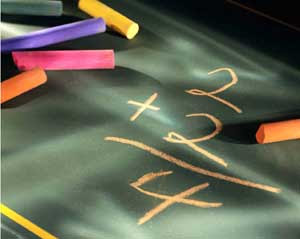Numeracy
 Phil Morgan writes, “In the financial section of yesterday’s newspaper, an economics professor wrote that people lack numeracy. From the context, I gather that it means they stink at math, but when did it beome a word?”
Phil Morgan writes, “In the financial section of yesterday’s newspaper, an economics professor wrote that people lack numeracy. From the context, I gather that it means they stink at math, but when did it beome a word?”The first instance that I can find is from 1959. It was used in a report by an Advisory Council for Education commissioned by the British Ministry of Education: “When we say that a historian or a linguist is ‘innumerate’ we mean that he cannot even begin to understand what scientists and mathematicians are talking about... It is perhaps possible to distinguish two different aspects of numeracy that should concern the Sixth Former.” (In America, that would be the equivalent of the junior and senior years in high school.)
It was built on the model of literacy, which evolved from literate. Numeracy evolved from numerate, an adjective meaning skilled at math. That, in turn, came from number with the -ate suffix thrown in. Rather than focusing on esoteric math, numeracy seems now to be concerned with the math needed in everyday life. Think compound interest or the stock market, for instance. In fact, many commentators are careful to separate the terms numeracy and mathematics.
At the root of literacy is a Latin word meaning letter; the Latin root behind number means a sum or numeral. In no time at all, we’ll be dealing with historacy and chemistracy.
SIDEBAR: Numeracy
Now available from McFarland & Co.: Word Parts Dictionary, 2nd edition
Listen to Mike’s program in real time every Tuesday morning, 9:00 - 10:00 a.m. EST, by going to wtcmradio.com and clicking on Listen Now. There is no archive.
Write to Mike with comments or questions:
wordmallATaol.com
(substitute @ for AT above)
wordmallATaol.com
(substitute @ for AT above)
Check out Mike's program-based books here:
Arbutus Press
http://arbutuspress.com/store_ling.html
or at Amazon.com
Arbutus Press
http://arbutuspress.com/store_ling.html
or at Amazon.com
Visit the Senior Corner at http://seniors.tcnet.org


Comments